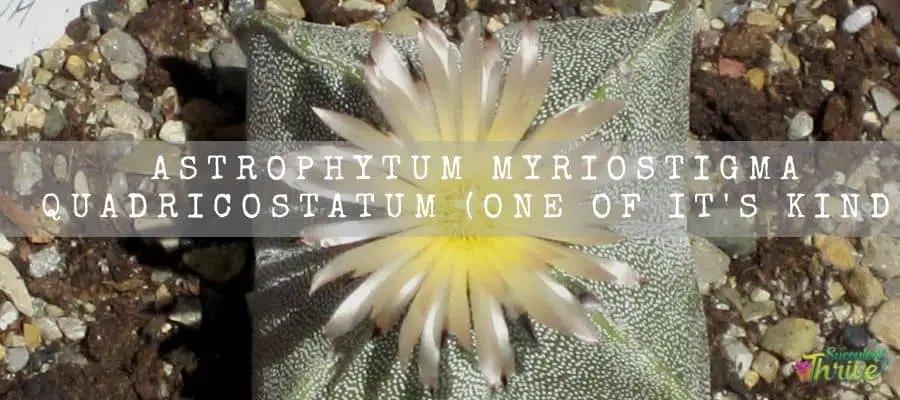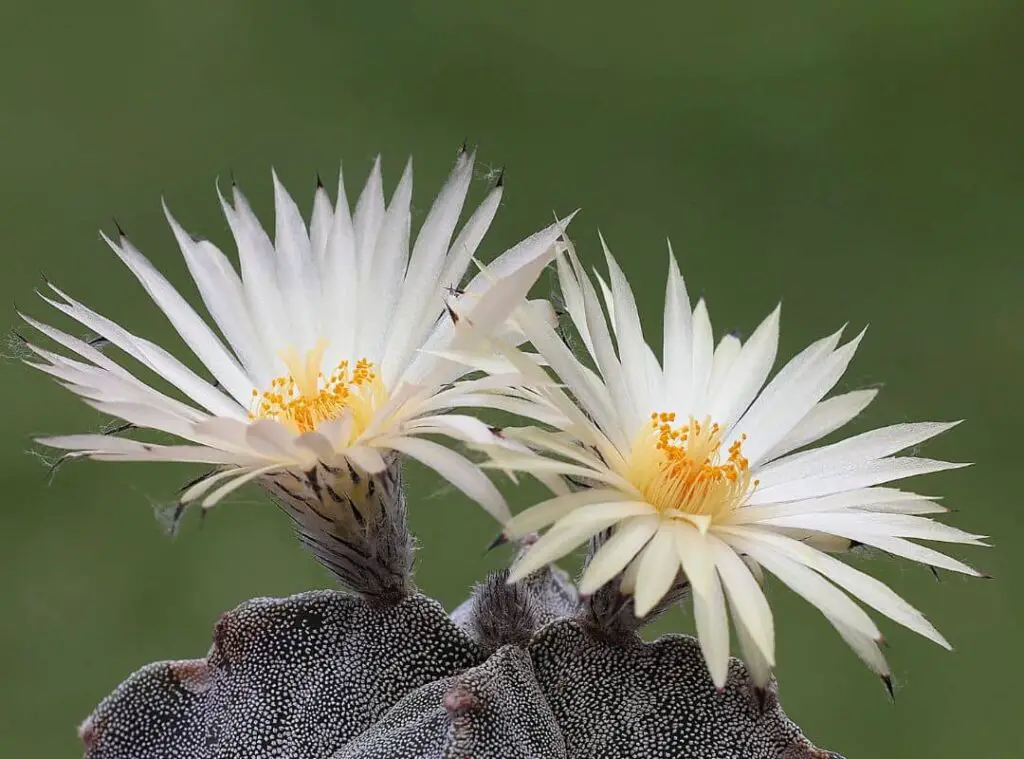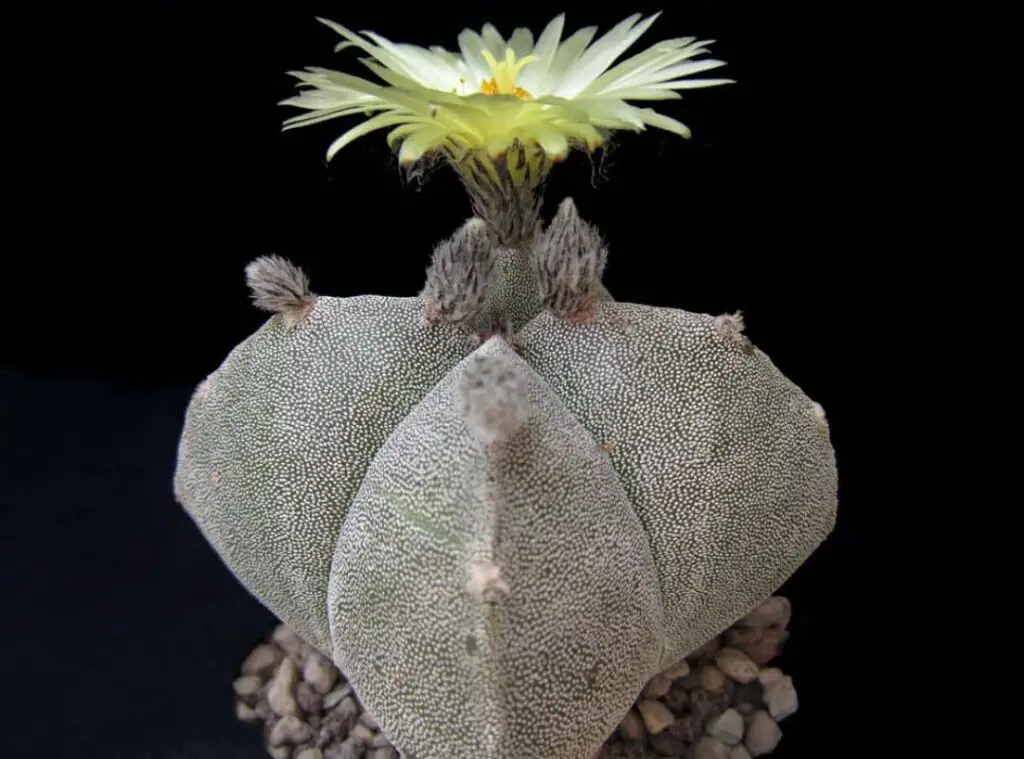Astrophytum myriostigma quadricostatum which is commonly called Bishop’s cactus are an attractive set of plants which would catch anybody’s attention.
This is one of the most sought-after plants by the succulent enthusiasts and they are quite popular for their unique looks among the succulent lovers.

In addition to that, Astrophytum myriostigma quadricostatum could be easily maintained too. They are not the type of plants which you need to spend a lot of time and take care of.
Astrophytum myriostigma quadricostatum are small globe shaped plants which belong to the cactaceae family.
The highlight of these plants is their gray green colored stems which would further develop with white spots. Above all, these are flowering plant species also. So, let’s find out more about these plants.
How do I identify Astrophytum Myriostigma Quadricostatum?
Astrophytum myriostigma quadricostatum stem would tend to take a quadrangular to almost spherical shape. They would become shorter as they grow older.
They are smooth to the touch and would reach a maximum width of 10cm at maturity. Besides, their maximum height would be 90cm ( 36 inches ) when they are fully mature. They grow as spineless plants.
Furthermore, they may also consist of about 4 ribs too. Astrophytum myriostigma quadricostatum flowers would arise on top of the areoles at the stem edges. Those flowers would be 5 cm in width.
Besides you could spot them in pale yellow or shining silk manner too. They would usually flower in spring or in late summer. Having said that, Astrophytum myriostigma quadricostatum which are about 6 years old will only bloom.
Size of the plant
Astrophytum myriostigma quadricostatum would grow up to a maximum height of 90 cm ( 36 inches ). Further they would be about 10 cm in width when they are fully mature.
Growth rate
Astrophytum myriostigma quadricostatum are slow growing cultivators.
One look care guide
| Botanical Name | Astrophytum myriostigma var. quadricostatum |
| Common Name | Bishop’s cactus |
| Plant Type | Succulent / cactus |
| Sun Exposure | Full sunlight to partial shade |
| Soil Type | Well draining |
| Soil pH | Neutral |
| Bloom Time | Spring |
| Flower Color | Yellow |
| Hardiness Zones | USDA hardiness zones 9a-11b -6.7 °C (20°F) |
| Toxicity | Non toxic |
| Average price | $ 9 |
How do you take care of Astrophytum myriostigma quadricostatum
Light Requirement
Astrophytum myriostigma quadricostatum would perform well If they get morning sunlight when the sunrise is not too intense. Furthermore, you need to protect the plants from the intense sunrise of the day, especially when the sunrise is not too intense.
I encourage you to place the plants closer to a bright sunny windowsill when you cultivate them indoors as only then can they absorb the essential sunlight levels.
That said, you need to still ensure that they are not placed closer to glass windows unless the sunlight would be too extreme for them.
If you cultivate them outdoors, you should locate them in a spot where they can still fulfill sunlight levels and still be protected from the intense sunlight levels.
If you have grown them indoors for extended periods and want to expose them for some summer light, do it slowly which will allow the plants to become accustomed to those conditions.
Temperature and humidity
Astrophytum myriostigma quadricostatum are supposed to be tolerant of freezing temperatures.
To be precise they can withstand low level temperatures such as-4 degrees Celsius and -10 degrees Celsius for some time. However, you may plant them in green houses during winter times.
Is it cold hardy?
Astrophytum myriostigma quadricostatum are somewhat frost tolerant.

Growth Zone
Astrophytum myriostigma quadricostatum would thrive well in USDA hardiness zones 9a-11b -6.7 °C (20°F)
Watering Requirement
Astrophytum myriostigma quadricostatum need to have moderate watering right throughout so that they can grow to their best potential.
Do not ever leave the plant’s roots to be in waterlogged soggy conditions as it would turn out to be lethal on the plants. Ideal way to water these plants would be to water them first and then allow them to dry.
Generally speaking, they will perform well with once-a-week watering during their growing season. Never water them when they are dormant as they would be literally in the relaxing mode and would not consume any of the energy during this time.
Furthermore, to avoid over watering you need to always ascertain whether the soil is dry from the previous watering and then proceed with watering.
Soil Requirement Type / pH
In terms of the right soil mix, you need to check whether their soil has excellent draining as it is the prime requirement of the chosen soil mix.
Besides that, it has to have a good aeration as well. Ideally you need to go for a mineral bases substrate which would fit in well for these plants.
In addition to that, many people wish to go ahead with commercially made succulent soil mixes as they would provide healthy growing conditions for the plants.
Pot size Potting and Repotting
Selecting a well-draining pot is indispensable just like selecting a well-draining soil mix to grow these precious plants.
Additionally, a porous material pot would be ideal to grow these plants as they would evaporate the excess moisture at a faster rate.
Repotting could be done once every other year. These are slow growing plants which literally means you don’t have to transplant them quite often. It is noteworthy that you need to consider repotting the plants when you first purchase them from the stores.
When repotting, you need to take the plants out from the pot and then clean all the older soil around the roots. Moreover, if you spot any blackened plant part you need to cut them off.
Next let them dry and after that you can pot them in the new pots. Transplanting them is quite crucial as it would provide new growing conditions for the plants.
Where to Plant
Astrophytum myriostigma quadricostatum have a strong demand when it comes to sunlight. So, if you grow them in an outdoor garden, you need to choose a brightly lit place where they can gain morning sunlight and partial shade during the midday hours.
Further they would want to have a warmer climate also to grow to their best potential. If you live in USDA zones 9a-11b -6.7 °C (20°F), you can grow them outdoors as those conditions would suit these plants the best.
Fertilizer and time of year
You can consider adding some fertilizers when they are in their actively growing season. I suggest you use low nitrogen fertilizers during spring and summer to do this task.
Flower
Astrophytum myriostigma quadricostatum would emerge with flowers in yellow. Furthermore, they will flower in the spring season. it would be wonderful to watch them specially when you have potted them in containers.

Dormancy
Astrophytum myriostigma quadricostatum are winter dormant plants.
Toxicity
No records to show the toxicity of these plants.
Common bugs and illnesses
Astrophytum myriostigma quadricostatum may go through pests’ infestations specially from regular pests such as mealybugs.
Aphids, scales etc. If the pests have invaded your plants, you need to immediately quarantine the plants so that it would avoid spreading it to other plants In addition to that you can treat the plants with fungicides or if the pest’s infestation has spread on a severe level, you can even consider repotting them.
Last but not least, you need to ensure that you are removing all the decaying plant materials unless they would attract more pests to the plants.
Furthermore, ensure that you are keeping the surrounding of the plants neat too so that it would be less attractive for the pests. Last but not least, if you supply them with excess water, it will pave the way for diseases such as root rot etc.
How to propagate Astrophytum Myriostigma quadricostatum
You can use the seeds propagation method to propagate the Astrophytum myriostigma quadricostatum plants.
That said, these are slow growing plants, and they would consume a lot of time to reward you with the results of the propagation process. Apart from that you may consider grafting the plants also.
Astrophytum myriostigma quadricostatum benefits
Astrophytum myriostigma quadricostatum would be handy as container plants. They would be great picks to plant them in the patios.
Furthermore, if you live in aforesaid zones, you can grow them in outdoor gardens too. Other than that, you could use them as bonsai plants too.
Conclusion
Astrophytum myriostigma quadricostatum are glamorous plants which would attract anybody’s attention.
Even a fresher can start gardening these plants since they don’t come up with thorns. Further their ability to thrive with minimum supervisions make them ideal choices for the starters in gardening. Their exceptional geometry is one more special characteristic of these plants.
Read Next : Astrophytum Myriostigma Cv. Kikko ( Unique Cactus )
